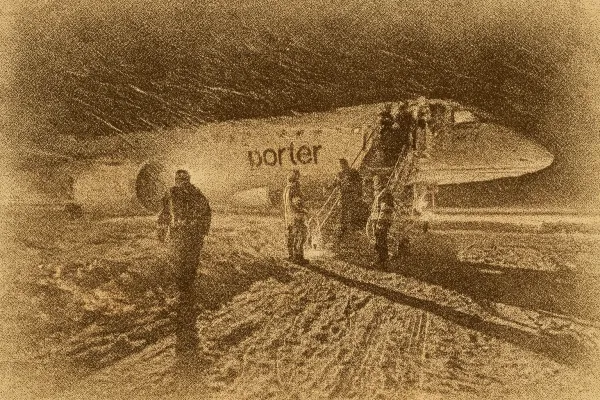
This edition of The Canada Report is based on coverage from CBC, CityNews Vancouver, CTV, Calgary Herald, Yahoo, Insauga, Global, Country94, Yukon News, CIM Magazine, Mining Weekly, Nunatsiaq News, and the Good News Network.
This Week at a Glance
The Bank of Canada has lowered its key interest rate to 2.5%, aiming to stimulate the economy. In British Columbia, the BCGEU strike continues, impacting the mining sector. Alberta is revising its industrial carbon tax approach, offering companies more flexibility. Meanwhile, Manitoba introduces a new hunting buffer zone, and New Brunswick tackles homelessness with a new task force. These developments influence economic conditions, public services, and community well-being across Canada. Here's what's happening.
The State of Things
The Bank of Canada has decided to give the economy a little nudge by lowering its key interest rate to 2.5%. This marks the first rate cut since March, and it's all about trying to breathe some life into our sluggish economy. With inflation easing (minus the gas prices, of course) and a job market that's not exactly booming, the central bank is hoping this move will help balance the risks we're facing. Governor Tiff Macklem pointed out that while the U.S. trade war is still causing headaches, the removal of certain tariffs has reduced some inflationary pressures.
Meanwhile, in Calgary, NORAD jets made an unexpected appearance in response to bomb threats on flights from Germany. Thankfully, these threats turned out to be false alarms, but it was a reminder of how closely Canada and the U.S. work together to keep our skies safe. NORAD's quick response is a testament to decades of cooperation, ensuring that when something goes awry, we're ready to handle it.
On the ground, food banks across Canada are sounding the alarm on food insecurity. With a 40% increase in demand over the last two years, many Canadians are struggling to put food on the table. The latest report card from Food Banks Canada gives the nation a dismal D grade, highlighting the urgent need for policy changes. While there's some hope with new federal programs, experts stress that addressing income issues is crucial to turning the tide on this growing crisis.
Source 1 | Source 2 | Source 3
Across the Map
British Columbia
British Columbia is seeing some serious picket line action as the BC General Employees’ Union (BCGEU) strike hits its third week. This time, the focus is on the province's mining sector, with government employees who ensure safety and environmental compliance joining the fray. The union, which represents 8,500 public service workers, is pushing for an 8.25% wage increase over two years, arguing that their wages have lagged behind inflation and the provincial average.
Paul Finch, BCGEU president, points out that while Premier David Eby is keen on fast-tracking resource projects, these can't proceed without the civil servants who handle the nitty-gritty of safety and environmental regulations. The strike is already causing ripples, with overtime bans affecting correctional officers, sheriffs, and liquor distribution warehouses. The union hopes this expanded action will nudge the provincial government back to the bargaining table. Meanwhile, B.C.'s mining industry, projected to generate a hefty $18 billion by 2025, could face delays without these essential workers.
Alberta
Alberta's shaking up its industrial carbon tax game, and it's all about giving companies more wiggle room. Premier Danielle Smith announced that instead of just paying fees for emissions, companies can now invest in their own emissions-reducing projects. Think of it as a bit of a recycling program for carbon credits. The idea is to keep businesses competitive while nudging them towards greener practices.
But not everyone’s cheering. Critics like the Pembina Institute worry about potential "double-counting" of carbon credits, which could dilute their value and undermine the whole system. Meanwhile, smaller companies might find some relief, as they can opt out of the carbon pricing system by 2025.
The changes come after consultations with industry bigwigs, but some, like NDP energy critic Nagwan Al-Guneid, argue the process was too selective and lacked detail. As for the carbon price freeze at $95 per tonne, the jury's still out on when that might thaw. Alberta's playing a high-stakes game with emissions, and it’ll be interesting to see how this unfolds.
Saskatchewan
In a tragic and puzzling event near Weyburn, Saskatchewan, 44-year-old Tanya Myers was fatally shot while riding as a passenger in an SUV on Highway 39. The incident, which occurred last Friday evening, has left her family and community in shock. Myers, described by her family as an "amazing energy healer" and devoted cat lover, was on a rare outing when the shooting happened.
The RCMP is still piecing together the details, noting that another vehicle on the same highway had its tire shot around the same time. While the motives remain unclear, the police are urging anyone with information to come forward. Superintendent Joshua Graham emphasized the need for answers, whether the shooting was accidental or intentional. As the investigation continues, the community is left grappling with the loss and seeking justice for Myers.
Manitoba
Manitoba is shaking things up in the hunting world with a new buffer zone for the 2025 season, and it’s got everyone talking. The province has carved out a 500-metre buffer on either side of Rice River Road and the Bloodvein River, aiming to give moose populations a fighting chance to recover. This move, based on community feedback, is a nod to conservation and collaboration, but not everyone’s thrilled.
The Manitoba Wildlife Federation feels blindsided, arguing that the last-minute decision sets a shaky precedent. Bloodvein First Nation, however, stands firm, having already set up a checkstop to turn away non-Indigenous hunters, citing overhunting concerns. Premier Wab Kinew is calling for calm, reminding everyone that hunting near roads is a no-go anyway. As the debate simmers, it’s clear that finding common ground will require some serious sit-downs.
Ontario
In Hamilton, a troubling trend has emerged, with distraction thefts targeting seniors on the rise. A recent incident caught on video shows a 40-year-old woman using a friendly facade to rob an elderly homeowner. The suspect, described as medium build and about 5-foot-7, approached the victim with hugs and a fake necklace, only to make off with the victim's genuine gold jewelry. This isn't an isolated case—distraction thefts have jumped from nine in 2021 to 54 in 2024, with 43 already reported this year.
Police are urging residents to be cautious of strangers offering unsolicited gifts or gestures. If you find yourself in a similar situation, it's best to step away and contact authorities. Sharing this advice with elderly relatives and friends could help prevent further incidents. If you recognize the suspect from the video, Hamilton Police are asking for your help in identifying her.
Quebec
In a case that's been both heartbreaking and complex, a Quebec mother has been found not criminally responsible for abandoning her toddler in a field near St. Albert, Ontario. The decision, made by Judge Bertrand St-Arnaud, comes after it was determined that the mother was suffering from a severe mental disorder at the time. The little girl, who was found dehydrated and in distress, is now with her father but continues to face emotional challenges.
The mother, who remains unnamed to protect her daughter, will stay in a Montreal psychiatric hospital. Despite improvements in her mental health, the court decided she still poses a risk to the public. The case highlights the delicate balance between mental health issues and public safety, a topic that often stirs debate in Quebec. As the legal process continues, the focus remains on ensuring the well-being of both the mother and her child.
New Brunswick
New Brunswick is rolling up its sleeves to tackle a growing crisis: homelessness. The province has launched a ministerial task force, chaired by Housing Minister David Hickey, to address the issue head-on. With homelessness up by a staggering 210% over the past four years, it's clear that swift action is needed. Moncton alone has over 500 people experiencing chronic homelessness, and the ripple effects are felt across the province.
This task force isn't just a group of ministers having coffee chats. It's a coordinated effort involving housing, justice, social development, and more. Their goal? To create a provincial homelessness strategy that’s both humane and practical. They’re also looking to expand existing initiatives like the rent cap and mental health support.
Moncton’s Deputy Mayor, Paulette Thériault, highlights the urgency, noting the visible struggles on the streets and the community's growing concern. With nearly 1,000 people in need of stable housing, the task force has its work cut out, but it’s a step in the right direction.
Nova Scotia
In a troubling development from Nova Scotia, a 75-year-old former swim instructor at the Nova Scotia Youth Centre is facing a staggering 66 charges related to sexual assaults. Donald Douglas Williams, who worked at the facility from 1988 to 2017, was arrested at his Dartmouth home after a four-year investigation dubbed Operation Headwind. The RCMP has been meticulously piecing together this case, interviewing over 450 individuals and sifting through nearly 10,000 documents. The charges, which include sexual assault and exploitation, relate to alleged incidents involving more than 300 youths between 1989 and 2015. Williams is due in Kentville provincial court on September 26. The investigation is ongoing, and police urge anyone with information to come forward. This case highlights the courage of survivors who have stepped up to share their stories, helping to bring these serious allegations to light.
Prince Edward Island
Prince Edward Island is shaking things up in the trapping world with some new rules that aim to keep both critters and our four-legged friends safer. The province is rolling out changes to trapping and snaring regulations, taking cues from a recent review by the Canadian Wildlife Health Co-operative. The big news? Snares are now banned on public lands, and baited snares are a no-go. Plus, trappers will need to keep their skills sharp with ongoing training.
It’s all about striking a balance, says Brad Potter from P.E.I. Fish and Wildlife. The changes aim to maintain the trapping industry while addressing public concerns, especially around pet safety. Landowners now have more say, too—they can remove traps from their property without asking first. It’s a step towards more humane practices, and animal advocates are hopeful it’s just the beginning.
Newfoundland and Labrador
Newfoundland and Labrador are gearing up for a provincial election on October 14th, and it’s shaping up to be quite the political showdown. Premier John Hogan, leading the Liberals, kicked off the campaign with a visit to Government House, accompanied by his wife and their dog, Rooney. Hogan’s Liberals are aiming for a fourth consecutive term, but they’ve got competition. Tony Wakeham of the Progressive Conservatives and Jim Dinn of the NDP are both in the race, each leading their parties into an election for the first time.
The stakes are high, with 40 seats up for grabs in the House of Assembly. The Liberals currently hold 19 seats, while the PCs have 14. The NDP, with just one seat, is hoping to make gains despite fielding fewer candidates. Hogan’s campaign highlights include ongoing negotiations over the Churchill Falls energy deal, which he’s dubbed a priority. Meanwhile, Wakeham is focusing on wildfire preparedness, a hot topic after a devastating season. With advance polls opening soon, it’s anyone’s game in this Atlantic province.
Yukon
Yukon has lost a true pioneer with the passing of Ione Christensen at 91. Known for breaking barriers, she was the first female justice of the peace and juvenile court judge in Yukon, and later, the first female mayor of Whitehorse. Her trailblazing didn't stop there; she became the first female commissioner of the Yukon and served as a senator in Ottawa. But perhaps her most charming legacy is her century-old sourdough starter, a relic from the Klondike Gold Rush, now preserved in Belgium's Sourdough Library.
Tributes are pouring in, with Yukon Premier Mike Pemberton calling her a "true trailblazer" who inspired countless Yukoners. Flags are flying at half-mast in her honour, a nod to her lifetime of service and her indomitable spirit. Christensen's life was a testament to the power of kindness, hard work, and courage—a true embodiment of the Yukon's larger-than-life spirit.
Northwest Territories
In a move that could redefine mineral exploration in the Northwest Territories, the Canadian and territorial governments are teaming up to give old drill samples a high-tech makeover. By using AI and digital core scanning, they're diving into the archives of the Northwest Territories Geological Survey to unearth new mineral opportunities in the Slave Geological Province. This region, stretching across 190,000 square kilometres, is a treasure trove of lithium, copper, cobalt, and rare earth elements just waiting to be discovered.
The project isn't just about finding minerals; it's about doing so sustainably. By re-examining existing core samples, the initiative minimizes environmental impact, sparing the land from further disturbance. Plus, the data will feed into a national Digital Core Library, making it easier for everyone to access and explore.
And while we're talking about the future, the Northwest Territories isn't stopping at minerals. Plans for infrastructure projects like the Mackenzie Valley Highway and the Arctic Security Corridor are also in the works, aiming to bolster the region's connectivity and economic potential. It's a bold step forward, blending technology and tradition to unlock the North's hidden wealth.
Nunavut
The federal government has announced a plan to build 700 affordable homes in the territory as part of the new Build Canada Homes initiative. While this sounds like a win for a region where over 60% of residents rely on public housing, the details are still a bit foggy. Lorne Kusugak, Nunavut’s finance minister, is optimistic but admits we’re still waiting on the nitty-gritty like funding specifics and timelines.
The plan is to integrate these homes into the Nunavut 3000 project, which aims to build 3,000 homes by 2030. Meanwhile, Joe Savikataaq, MLA for Arviat South, is crossing his fingers that the new modular homes factory in Arviat will get a piece of the action, potentially boosting local employment. Let’s hope the federal government’s trust in Nunavut Housing Corp. translates into real roofs over heads soon!
Warm and Fuzzy
In a twist that feels straight out of a feel-good movie, Daniel Drouin from Prince Edward Island has found a silver lining in what could have been a devastating summer. After his home was tragically lost to a fire, Drouin's luck took a remarkable turn when he won a charity raffle for a new cottage. The $50 ticket, bought at his girlfriend's suggestion, turned out to be a golden ticket—offering him the choice between a cozy prefabricated cottage or a cool $150,000.
Drouin, a musician and father of two, described the win as "life-changing" and a chance for a fresh start. With his family temporarily scattered, the prospect of a new home is a beacon of hope. It's a story of resilience and unexpected fortune, reminding us that sometimes, when life closes a door, it opens a window—or in this case, a cottage door.
As Drouin prepares to fill out the paperwork, he reflects on the odds of winning amidst over 10,000 entrants. It’s a heartwarming reminder that sometimes, just sometimes, the universe throws a little magic our way.
Straight Facts
In the small town of Vulcan, Alberta, a quirky twist of fate has turned it into the "Star Trek Capital of Canada." Originally named after the Roman god of fire, Vulcan found itself in the spotlight when Star Trek fans mistook it for the home planet of Mr. Spock. Embracing this cosmic coincidence, the town now boasts a starship-shaped visitor centre and hosts annual Trek conventions. It's a delightful example of how a bit of sci-fi serendipity can transform a community into a must-visit destination for Trekkies worldwide.
Canadian Recs
If you're ever in Churchill, the Tundra Pub is a must-visit. Known for its Borealis Burger, this spot offers a cozy vibe with a menu that caters to all tastes, including plenty of vegetarian options. Stick around for their lively Open Mic nights and enjoy a pint of local brew. It's the perfect place to unwind after a day of exploring the subarctic wonders. Check it out
Let's Recap
Canada's got plenty on its plate, from the BCGEU strike heating up in British Columbia to a puzzling tragedy near Weyburn, Saskatchewan. Keep an eye on Newfoundland and Labrador as they gear up for a provincial election. If you need a break, maybe plan a visit to the Tundra Pub in Churchill for a Borealis Burger. Dive into the details, share your thoughts, and we'll be back next time with more.








